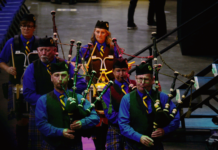 “I am more than happy to have been given the opportunity to attend UCR. I think it’s the best thing that has happened to me. I know it’s not a ‘Utopia,’ but I feel that it creates an atmosphere that is most congenial to study. It’s my firm belief that black students of today are the answer to the American problem. We must prepare, we have got to be better…the general atmosphere of UCR, I feel, are great contributing factors to this end,” says Peple Samuels in the UCR Student Testimonials in 1968. His words, among the testimonials of other black students that year, paint richness about the time capsule presented by the African Students Program (ASP) in the Rivera Library in honor of Black History Month. The exhibit, centered on “The Student Experience,” presents news prints, event flyers and pictures from over 40 years at UCR, depicting the significant obstacles that the black community has overcome to foster the socially just campus atmosphere that exists today. The four displays show the growth and development within the movement, solidarity, activism and outreach, and a tribute to the life and legacy of Martin Luther King Jr., which offers a glimpse into how far our university has travelled from the racial intolerance that characterized the Civil Rights era.
“I am more than happy to have been given the opportunity to attend UCR. I think it’s the best thing that has happened to me. I know it’s not a ‘Utopia,’ but I feel that it creates an atmosphere that is most congenial to study. It’s my firm belief that black students of today are the answer to the American problem. We must prepare, we have got to be better…the general atmosphere of UCR, I feel, are great contributing factors to this end,” says Peple Samuels in the UCR Student Testimonials in 1968. His words, among the testimonials of other black students that year, paint richness about the time capsule presented by the African Students Program (ASP) in the Rivera Library in honor of Black History Month. The exhibit, centered on “The Student Experience,” presents news prints, event flyers and pictures from over 40 years at UCR, depicting the significant obstacles that the black community has overcome to foster the socially just campus atmosphere that exists today. The four displays show the growth and development within the movement, solidarity, activism and outreach, and a tribute to the life and legacy of Martin Luther King Jr., which offers a glimpse into how far our university has travelled from the racial intolerance that characterized the Civil Rights era.
Since its early days as the Black Student Union, African Student Programs (ASP) has paved the way for remarkable milestones that have made UCR distinct from any other UC. In 1968, Charles Jenkins gathered over 60 students to form the original student group. During the following year, the Black Student Union established the former Black Studies Department to usher the inclusivity of black students. However, it would later be dissolved and offered as an interdisciplinary study. Nonetheless, members of the student group continued to build a niche for other black students where they could seek comfort and support. Offering services and a safe place for students, the Black Student Union solidified its presence on campus in the movement for a more culturally diverse academic environment for both students and faculty members. It was not until 1979, however, that the student group, then known as Black Student Activities, officially gained recognition on campus and changed its name to Black Student Programs under the direction of Kathryn Jones.
For a brief period in time, the Black Studies Department was created. However, because of a lack in minority faculty members and other issues, the major was dissolved and made into an interdisciplinary study instead. In response, official black, Chicano and Native American student organizations joined in solidarity to form the Tri-Council Coalition, protesting for their right of recognition on campus. Collectively, the minority groups set UCR on its way to reaching a lasting embrace of its diverse community members, their interests and cultural traditions.
Since the 1980s, what is now known as the African Student Programs has only grown more unified, representing values on which UCR is based: commitment to service, academic excellence and integrity. Today, over 40 black faculty members help promote such values at UCR. 15 black student-led organizations cater to students with different career interests and offer opportunities for community-based service and social bonding.
ASP also provides black students with a sense of inclusivity that extends beyond its office next to Costo Hall: first year students have the option of living in a Pan-African Theme Hall (PATH) in the Pentland Hills Residence Hall, where they can meet students with similar academic interests
and learn more about the Pan-African culture. Students in the designated hall attend academic workshops, guest presentations and social events with their specific goals in mind. Similarly, the Academic Mentorship Program (AMP) allows students to seek peer support and career-related opportunities on the road to academic success.
At the end of each school year, ASP celebrates the achievements of students who have earned a spot on the Dean’s List during at least one academic quarter and those who have received other honors and scholarships. Since 1999, ASP has also continued to hold a yearly Black Graduation ceremony in recognition of the academic excellence of black scholars. The graduate tradition of wearing African Kente cloth stoles not only represents their heritage, but their relentless resilience.
With its spectrum of student services and opportunities for personal growth, it is no wonder that ASP remains a presence on campus—the only one of its kind on any UC campus. Today, more African American students attend UCR than any other UC campus. Furthermore, students of African descent are known to graduate at higher rates than any other ethnic group on campus. With its history and commitment to improving the future, ASP will only continue to enhance the quality of the academic experience on campus for members of all races and ethnicities.








